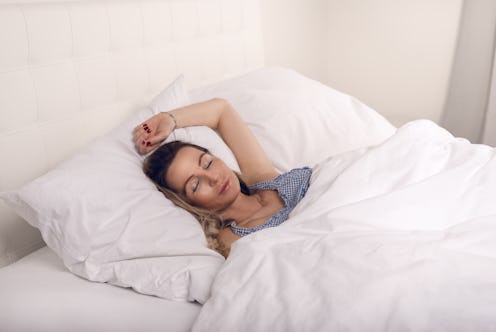Life
7 Solutions To Try If You Sweat A Lot At Night, According To Experts

Getting enough quality sleep each night is important to your overall health and wellbeing. But waking up in the middle of the night drenched in sweat is sure to get in the way of that. If you have night sweats and they are keeping you up, there are some simple things you can do to reduce it.
Before you start looking for solutions, the most important thing to do is figure out why you're having night sweats in the first place. As Bill Fish, certified sleep science coach and co-founder of Tuck, tells Bustle, it's a little tricky.
"True night sweats are known as sleep hyperhidrosis," Fish says. "It's known as persistent sweating or flushing that drenches your sheets, interrupts your sleep, and occurs independently of environmental factors."
According to Fish, that last part is key. "Many times what people think are night sweats are actually caused by your environment or even current condition," he says. Wearing heavy pajamas, sleeping in a room that's too hot, and dealing with a cold, can all cause you to sweat in your sleep. In these cases, these are not "true night sweats." But other things like menopause, medications, antidepressants, anxiety disorders and pregnancy, are known to be legitimate causes of night sweats.
How you deal with it really depends on the cause. So here's what you can do to reduce excessive sweating at night, according to experts.
1Reduce The Temperature In Your Room
Be practical. "In order to reduce or even alleviate night sweats, a great first step would be to lower the temperature in your bedroom," Fish says. Sleeping in a cooler environment will not only help you get to sleep much easier, it should also help you deal with night sweats. For adults, the best possible temperature for sleep is 60 to 67 degrees. For babies and toddlers, it rises to 65 to 70 degrees.
2Make Sure Your Beddings And Sleepwear Have Cooling Characteristics
"In terms of bedding, it's best to seek out sheets comprised of materials such as tercel, microfiber, or even linen," Fish says. "All are quite breathable and will help to keep your body cool while sleeping." For sleepwear, you want to aim for light breathable clothing. If you're still experiencing night sweats a week after making practical environmental changes, Fish suggests seeing a physician.
3Avoid Eating Right Before Bed
Eating and snacking right before bed may not be the best idea if you find you're sweating a lot at night. As Dr. Rebecca Robbins, sleep expert and member of the Dagsmejan Scientific Advisory Board tells Bustle, "Certain foods may increase your body temperature or tendency toward sweating, such as spicy foods. So it's best to avoid these foods for dinner or close to bedtime." In general, the food you eat can play a role in whether you get night sweats. Besides spicy food, you may want to limit the amount sugar you're also consuming.
4Find Ways To Manage Stress And Anxiety
Stress and anxiety are common causes of night sweats. If your anxiety causes you to sweat during the day, it will have the same effect at night. "Stress tells your body there's a threat and you must fight it, so your body pumps out all kinds of stress hormones — the most well-known being the hormone cortisol," psychotherapist, Jen O’Rourke, MFT, tells Bustle. Elevated levels of cortisol and adrenaline can lead to an increase in sweat. So finding effective ways to manage stress can help to reduce night sweats. Journaling, reading, meditating, or taking a walk outside, are some things you can incorporate into your routine.
5Make Sure You're Getting Enough Vitamin B12
“Diet is linked to a vast number of health and physiological dysfunctions," Lisa Richards, a nutritionist and author, tells Bustle. "Night sweats are no exception to this fact." According to Richards, a vitamin B12 deficiency is known to be associated with night sweats. "This vitamin is common in animal products, meaning that vegans and vegetarians may experience night sweats as a result of not getting enough B12," she says. Some good sources of vitamin B12 include beef, liver, eggs, yogurt, and cheese.
6Avoid Caffeine And Alcohol Before Bed
Menopause is known to be one of the most common causes of night sweats in people due to the hormonal changes. This symptom can be lessened or avoided by staying away from certain foods before bed. For instance, Dr. Marisa Garshick, MD, chief medical correspondent for Certain Dri, suggests avoiding both caffeine and alcohol before bedtime. "Alcohol intake can cause blood vessels in the skin to widen, also known as vasodilation," she says. "When blood vessels become dilated, the skin can feel warm and flushed and lead to the release of sweat." Caffeine can also increase night sweats, due to the fact that it's a stimulant. This means it increases the sympathetic nervous system, which can lead to increased sweating. In fact, a 2015 study found that caffeine may worsen night sweats in postmenopausal women.
7Eat Nutrient-Rich Food And Get Enough Exercise
Your lifestyle habits can play a role in helping you reduce night sweats. Healthy practices, like getting exercise during the day, eating nutrient-rich foods, and having a relaxing bedtime routines, can be helpful in improving sleep quality. It can also help with your ability to fall and stay asleep. "Overall these are good practices for all of us and for those suffering from night sweats," Robbins says.
Night sweats can be frustrating to deal with, especially if it's causing you to lose a lot of sleep. These are just some simple things you can do to help reduce it. If you've done all you can possibly do yourself and it's still happening, you may want to discuss it with your doctor.